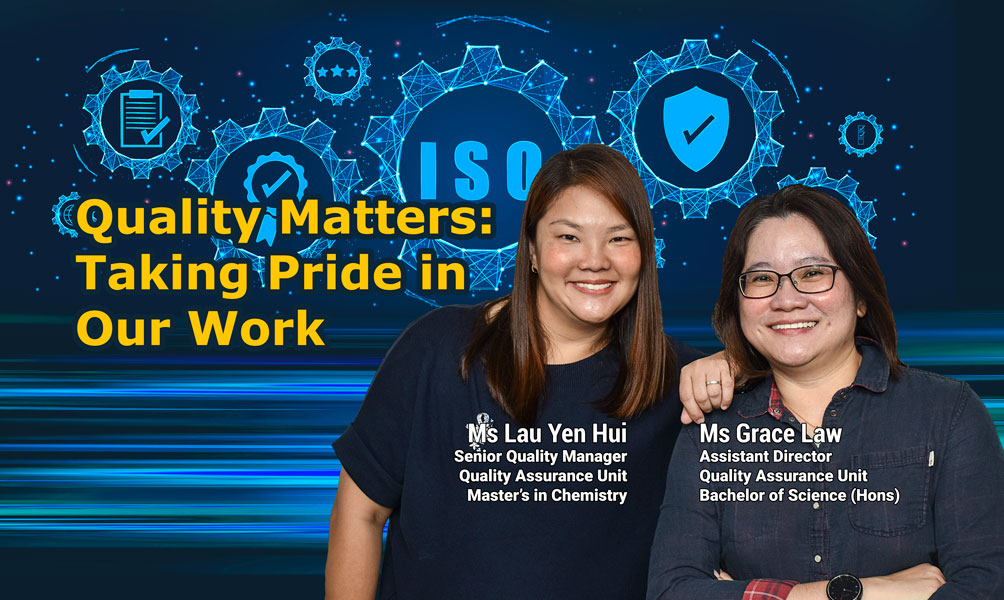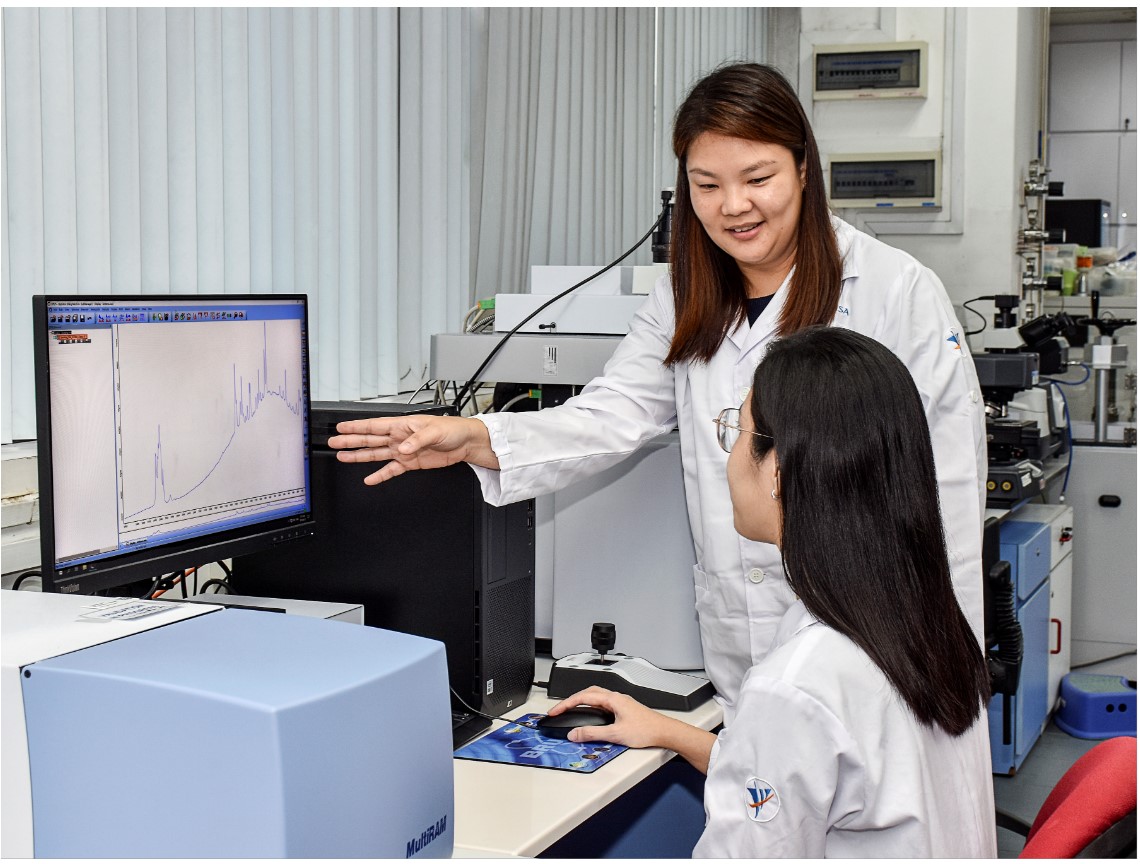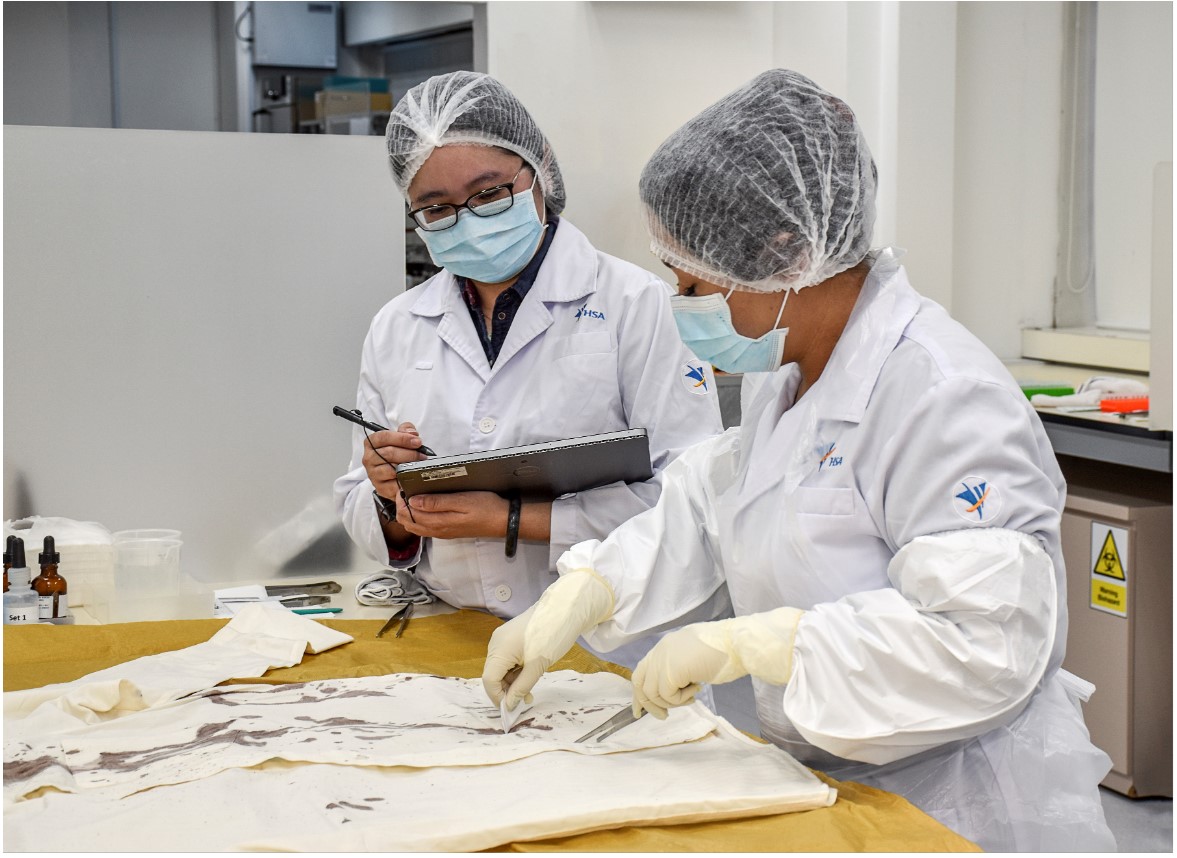Quality matters: Taking pride in our work

forensic science
Forensic quality managers are like the wardens of the forensic laboratories. They play the important role of ensuring that each laboratory upholds the required stringent quality standards. From analysing forensic exhibits as former forensic scientists, Yen Hui and Grace, now put their meticulous nature to good use to investigate quality issues and maintain an effective quality system for the laboratories.
Ms Lau Yen Hui
Senior Quality Manager, Quality Assurance Unit
1. What is your role as a Quality Manager?
Quality assurance and control are important aspects in forensic laboratories, as the results of the forensic examination are often required for the investigation of criminal justice. To safeguard the reliability of the results in forensic examination, a robust and effective quality system is essential to ensure and maintain the highest standard of accuracy in forensic science.
My role, as a Quality Manager, is to manage the quality activities and to maintain a structured, robust, and effective quality system in the Forensic Chemistry & Physics Laboratory. Some examples of such quality activities involve performing and coordinating internal audits and external assessments by accreditation bodies, performing surveillance on routine casework to ensure workflows and processes are in compliance with the laboratory quality system, and performing investigation and cause analysis when non-conforming work or issues occur in the laboratory.
2. What qualifications must you possess to become one?
The educational requirement that is required of a Quality Manager is typically a Master’s degree in science. Experience in quality management with good knowledge in relevant standards, such as the ISO/IEC 17025 standard, general requirements for the competence of testing and calibration of laboratories, and casework experience is a must for this position.
 Yen Hui interviews a laboratory officer to find out the performance of an advanced analytical equipment.
Yen Hui interviews a laboratory officer to find out the performance of an advanced analytical equipment.
As a quality manager, one needs to be meticulous and be able to influence and motivate others to uphold the high quality standards in the lab.
,
3. Can you describe some traits that make one a good quality manager?
As a quality manager, one needs to be meticulous and be able to influence and motivate others to uphold the high quality standards in the lab. The person should also be committed to career-long learning and stay abreast with the latest development and technologies to support the lab in the implementation and improvement of work processes.
4. Can you share some of your career highlights?
One of the challenging but fulfilling tasks I was given was a transformation initiative to convert all the laboratory’s accreditation-related, instrument and case records from hardcopy paper format to digital format, and to store them in structured Quality and Technical Records Libraries in our Laboratory’s shared network and storage repository. Beside scanning existing hardcopy records, new work processes to ensure records are “born and maintained” digitally while fulfilling the accreditation requirements need to be in place. This digitalisation process transformation has improved our work efficiency and reduced the use of resources such as paper and space. The benefit of our digitalisation effort was manifested during the COVID-19 pandemic when our laboratory personnel were able to access the records even when working from home!
Another of my career highlight as a quality manager was the opportunity to lead an assessment team from HSA to conduct a pre-assessment on the management and technical operations for the Division of Forensic Investigation of the Central Institute of Forensic Science (CIFS), Thailand, in 2016. It was my first assessment experience in an overseas forensic laboratory. This assessment provided an opportunity for both the HSA team and the CIFS personnel to learn from one another. The constructive and professional discussion during the assessment has also provided CIFS opportunities to improve on their quality system to better prepare the laboratory prior to applying for accreditation. Till this date, I still remember how hospitable the colleagues from CIFS were, getting mango sticky rice for us as snacks during the assessment days when they knew how much we liked the dessert, and bringing us to authentic Thai restaurants to try their local cuisine!
Ms Grace Law
Assistant Director, Quality Assurance Unit
1. What is the most memorable part of your work/career thus far?
My first DNA database hit when I was working as a forensic scientist in the DNA Profiling Laboratory! It was a serial snatch thief case where elderly women were targeted. The perpetrator was quick and elusive and would speed away on a bicycle after snatching the victims’ necklaces. As the crimes were committed in a flash, the victims could not get a good look at his face, and there was little evidence linking him to the cases. Then one day, the perpetrator was witnessed throwing an umbrella away. Subsequent DNA analysis done on the umbrella yielded a DNA profile which matched to a previous offender in the DNA database. The perpetrator eventually admitted to the crimes and the rest was history.
Most memorable for the quality assurance team? Our laboratories have digitalised our workflows and rely on a Laboratory Information Management System (LIMS) to handle these. During one of the assessments, the LIMS encountered a performance issue the moment the assessment started and this threw all of us into a panic. In the end, processing of casework had to temporarily stop while the IT department did the troubleshooting. With great teamwork, the system was restored, and we survived the assessment with no findings.
2. When you became a quality manager, was it on-the-job learning, or did you need to get additional qualifications/training? How do you keep up?
Other than being familiar with the laboratories’ quality management system and accreditation requirements, one needs to be certified minimally as an internal auditor by a reputable institution (e.g. accrediting body).
Forensic science is a rapidly evolving discipline, and it is pertinent to attend technical conferences and relevant trainings to stay abreast with new technologies from time to time, and to keep up with professional literature to increase awareness of developments. The quality manager must be aware of updates to standards to ensure that the laboratories’ quality systems continue to meet the requirements. It is thus vital for quality manager to attend and participate in quality-related international conferences and discussion forums.
Since communication is the key to quality, it is essential to maintain related soft skills to enable effective dissemination of information both within and outside the laboratories.
 Grace observes how a laboratory officer processes a crime exhibit to see if procedure is being followed.
Grace observes how a laboratory officer processes a crime exhibit to see if procedure is being followed.
The satisfaction of working in forensics is being able to find critical information that helps crime victims and their family, supports the administration of justice, and contributes to making our society a safer place for our loved ones.
,
3. Describe what you love most about your work.
The satisfaction of working in forensics is being able to find critical information that helps crime victims and their family, supports the administration of justice, and contributes to making our society a safer place for our loved ones.
Therefore, as a quality assurance team member, I need to monitor and ensure that the laboratories adhere to the defined standards so that work done by our laboratories is accurate and reliable, and the reports produced are recognised by our clients and the courts and can also be accepted internationally.
4. What would be your single best advice for people going into an interview for a job in forensics?
I think a lot of people have an interest in this field because of all the popular forensic dramas out there. Do not expect the job to be like what you see on TV - it's usually not as exciting nor glamorous. It is hard work and long hours are to be expected, BUT, speaking with first hand experience, I know that this job is a unique and highly rewarding one.
Related Articles